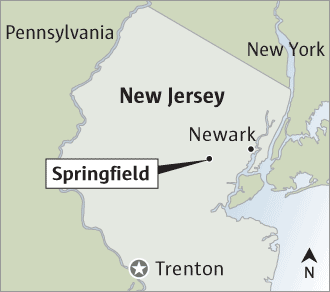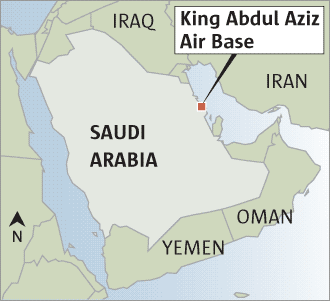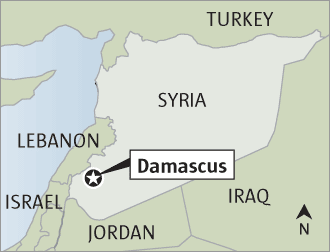— Chapter 1 —
A Rising Star
Seattle Times staff reporter
A graduate of West Point and a student of Islam, James Yee realized his goal of becoming a Muslim military chaplain shortly before the 9/11 attacks. Overnight, his knowledge of Islam became a sought-after commodity in the military.
AL KHOBAR, Saudi ArabiaAugust 1991
The flame of Islam already was flickering in James Yee when the 23-year-old Army lieutenant arrived here in the aftermath of the Gulf War.
A Patriot-missile officer just 18 months out of West Point, Yee was assigned to King Abdul Aziz Air Base near the shores of the Persian Gulf.
He arrived as a surge of interest in Islam was taking root inside the U.S. military. Eager to be a part of it, Yee became a regular at a Muslim center on the base. Thousands of American soldiers rotating through the region came to the center, set up by the Saudi government as a place where soldiers could socialize, learn about Islamic customs and, perhaps, become believers.
The Saudis who ran it showed Yee a 3-inch binder filled with short biographies of new converts. But the U.S. military had no Muslim chaplains to serve them.
An idea began to burn in Yee: He could be the first.
Years later, that simple idea — and virtually every step he would take to pursue it — would become the raw material of suspicion.
Jimmy, as his parents called him, grew up Lutheran in the small New Jersey town of Springfield. His parents were second-generation Chinese Americans. The middle-class family lived in a white, two-story home with red shutters. His father, Joseph, was an engineer with Bell Laboratories. His mother, Fong, was an energetic and feisty homemaker who carefully chronicled her five children's accomplishments in scrapbooks.
SPRINGFIELD, N.J.
James Yee was raised in this small town.

The parents packed the kids into the family station wagon every Sunday and shuttled them to nearby Holy Cross Lutheran Church. James' father drove but seldom stayed, preferring to work around the house and read the Sunday newspaper.
James was their middle child. He was easygoing and funny, small and athletic — becoming a star wrestler in high school. His wrestling coach, whom Yee considered a mentor, urged him to apply to West Point.
The U.S. Military Academy rests along the wooded banks of the Hudson River, an hour north of New York City. Adorned with parade fields, hilly pastures and stately granite buildings, the campus was an impressive sight for the Jersey teenager when he arrived in the fall of 1986.
![]()
Of the nearly 13,000 high-school seniors who apply each year to West Point, 1,200 are accepted. They're among the top in their classes academically, physically fit and have already displayed some aspect of the leadership the academy tries to develop. Bronze statues of Douglas MacArthur, George Patton and other military luminaries dotting the campus are a testament to the academy's success.
Yee fit easily into the measured cadence of cadet life. He made friends and envisioned a military career. But along with his burgeoning love of a life in uniform, a new passion was taking hold: Islam.
Yee had begun learning about the religion after his 1990 graduation from the academy through "interfaith dialogues" with college students. He began visiting local mosques in Kentucky and Germany, where he was stationed.
"What attracted me was the simpleness of its doctrine," he later said. "At the same time, it didn't throw out what I believed of Jesus Christ. We believe Jesus was sinless, that he performed miracles, was born of Mary, and that he will come again. So my beliefs in Christianity didn't go away; Islam held these beliefs."
In Saudi Arabia, his new faith flourished, as did his vision for a new career. As a chaplain, he could bring together everything he admired about the Army — the order, the discipline — with his newfound religion.
To become a chaplain, though, he needed a doctorate in divinity, and there were no Islamic U.S. seminaries at the time. The only alternative was a university, but Yee longed to study the traditional way, from Muslim clerics. To do that, he would have to leave active duty.
He got his chance in 1993. The Army was downsizing and giving soldiers the option to leave active duty for the Reserves. Yee jumped at the opportunity.
He made a pilgrimage to Mecca, in Saudi Arabia, a journey every able Muslim is expected to make at least once in a lifetime. When he returned to the United States, he took a job as a pharmaceutical sales representative for Pfizer. The drug company placed him in Jackson, Tenn., where he began saving for his studies.
His mind was set on studying in Syria. The choice worried his father: Syria was seen as a politically radical state. James thought the country was more socially and religiously liberal than Saudi Arabia. Women could even drive.
KING ABDUL AZIZ NAVAL BASE
James Yee was stationed here in the aftermath of the Gulf War in 1991.

DAMASCUS
Yee spent four years here studying Islam and Arabic.

Yee chose Abu Nour Islamic Foundation, located at the foot of Kaasyoun mountain in the capital city of Damascus. The school rose nine stories with two ornate spires that towered over a sea of brown, flat-terraced roofs.
When Yee arrived in 1995, the school was run by Syria's supreme religious leader, Sheik Ahmad Kuftaro, a moderate Sunni Muslim whose sermons and calls for peace drew thousands to his mosque. If Yee's love for the military was born at West Point, the Islamic values he would carry into the future were cultivated at Abu Nour.
Yee settled in, and though he struggled with the language, he immersed himself in studies. He soon spoke Arabic and taught English on the side. And he met a young woman.
Huda Suboh was 22, a Palestinian with dark eyes and a gentle face who dressed modestly. Her family had moved to Syria decades earlier.
She called him Yousef, Arabic for Joseph, Yee's middle name. The couple's dates started at her home with family members always present to chaperone. Nine months later, in October 1998, they wed. The had a baby daughter the following year.
Yee and his young family returned to the United States in 2000. By then, there were at least six Muslim military chaplains. Yee had missed his goal of becoming the first, but his ambition remained.
He wanted to return to active duty and become a chaplain but still lacked the minimum credits required by the military. Qaseem Uqdah, a friend and former Marine who ran the American Muslim Armed Forces and Veteran Affairs Council, helped ease the way. Uqdah's agency had been approved by the Pentagon to endorse Muslim chaplains.
He introduced Yee to the Graduate School of Islamic and Social Sciences in Leesburg, Va, which sent a letter to the Pentagon certifying his Syrian studies.
Finally, the goal born a decade earlier had been reached: James Yee was a chaplain, and his life was about to change.
In the spring of 2001, Yee was sent to Fort Lewis, south of Tacoma in Washington state. Now a captain, his duties were the same as those of any battalion chaplain: counseling soldiers of any denomination, helping families in times of loss. Yee and his young family settled into an apartment in Olympia, where they joined a mosque. Life became a comfortable routine — until Sept. 11, 2001.
In the moment it took a 767 jetliner to make contact with a New York skyscraper, James Yee's two worlds collided. Grieving Americans were asking questions: What kind of religion, and what kind of people, could condone such a thing?
The questions filtered through the ranks of the military. Muslim soldiers suddenly were the targets of suspicion.
Yee found himself at a pivotal moment: A Muslim devoted to his faith, an Army officer forged at the country's most respected military academy. He could answer the questions, he could plead for tolerance. People would listen. He realized he had a new mission.
And it was about to get its first test. Days after the attacks, his commander, Lt. Col. Orlando Goodwin, asked him for a briefing on Islam, for the soldiers. They deserved answers, he said.
They rounded up the 730-member battalion in a gym. The briefing lasted 30 minutes. Yee opened the floor to questions.
How do Muslims treat women? How could some justify the attacks?
"Yee told them that that's not really Islam. That it's like the Ku Klux Klan using Christianity to justify bigotry," Goodwin recalled.
Other commanders heard about the briefing, and soon Yee was in demand. And not just from officers. Muslims on the base came to him, worried that they might be ordered overseas to fight fellow Muslims.
"Whether Muslim or non-Muslim, criminals must be brought to justice," he told them.
Yee began fielding interview requests from local newspapers and television stations. Soon, national networks were calling.
The military's newest Muslim chaplain was a rising star.
Ray Rivera: 206-464-2926 or rayrivera@seattletimes.com
